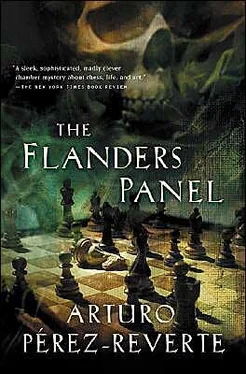Opponent, judge and spectators were awaiting his next move with ill-disguised irritation, for the game had gone on for far too long. The boy took one last look at his besieged king and, with a sad feeling of shared solitude, decided that all that remained for him to do was to commit one last merciful act and give him a worthy death at his own hand, thus avoiding the humiliation of being boxed in like a fugitive dog. He reached out his hand and, in a gesture of infinite tenderness, slowly upended the defeated king and laid him lovingly down on the empty square.
What I did originated a lot of sin,
as well as passion, dissension, vain words -
not to mention lies – in myself,
in my antagonist or in both. Chess drove me
to neglect my duties to God and to men.
The Harleyan Myscellany
When Cesar’s low voice stopped, he gave an absent smile and slowly turned his eyes from some indeterminate spot in the room to the ivory chess set on the table. Then he shrugged, as if to say, “Well, no one gets to choose his own past.”
“You never told me about that,” Julia said, and the sound of her voice seemed an absurd intrusion.
Cesar paused before replying. The light from the parchment lampshade lit only half his face, leaving the other half in shadow. The effect accentuated the lines around his eyes and mouth, emphasised his aristocratic profile, his fine nose and chin, like the effigy on an antique medal.
“I could hardly tell you about something that didn’t exist,” he murmured softly, and his eyes, or perhaps just the dull gleam of his eyes in the penumbra, rested on Julia’s. “For forty years I applied myself carefully to the task of believing that to be the case.” There was a mocking edge to his voice now, no doubt directed at himself. “I never played chess again, not even alone. Never.”
Julia shook her head, finding it all very hard to believe.
“You’re sick.”
He gave a short, humourless laugh.
“You disappoint me, Princess. I hoped that you at least would not resort to cliches.” He looked thoughtfully at his ivory cigarette holder. “I assure you I’m completely sane. How else could I have constructed with such meticulous detail this whole beautiful story?”
“Beautiful?” She looked at him in stupefaction. “We’re talking about Alvaro and about Menchu… Beautiful story?” She shuddered with horror and disgust. “For God’s sake! What the hell are you talking about?”
Cesar held her gaze, unmoved, and then turned to Munoz as if for support.
“There are… aesthetic aspects,” he said, “there are some extraordinarily original factors that can’t be dismissed in such a superficial way. The chessboard isn’t just black and white. There are higher planes, from which you can view events. Objective planes.” He gave them a look of sudden and apparently sincere pain. “I thought you’d both realised that.”
“I know what you mean,” remarked Munoz. He had not moved from his position, and his hands were still in the pockets of his crumpled raincoat. At one corner of his mouth, the vague smile had appeared again, indefinable and distant.
“You do, do you?” exclaimed Julia. “What do you know about it?”
She clenched her fists indignantly, holding in the breath that echoed in her ears like that of an animal at the end of a long run. But Munoz did not react, and Julia noticed that Cesar gave him a quiet look of gratitude.
“I was right to choose you,” he said. “And I’m glad I did.”
Munoz didn’t respond. He simply glanced around at the paintings, the furniture, the objects in the room and nodded slowly, as if he were drawing mysterious conclusions. After a few moments he indicated Julia with a lift of his chin.
“I think she deserves to know the whole story.”
“So do you, my dear,” added Cesar.
“Yes, I do. Although I’m here only in the role of witness.”
There was no note of censure or menace in his words. It was as if the chess player were maintaining some absurd neutrality. An impossible neutrality, thought Julia, because, sooner or later, there will come a point when words will run out and we’ll have to make a decision.
However, numbed by a sense of unreality she couldn’t shake off, she felt that that moment still seemed far off.
“Let’s begin, then,” she said, and when she heard herself speak, she found with unexpected relief that she was regaining her lost composure. She gave Cesar a hard look. “Tell us about Alvaro.”
Cesar nodded.
“Yes, Alvaro,” he repeated in a low voice. “But first I should mention the painting.” A look of sudden annoyance crossed his face, as if he’d neglected some point of elementary courtesy. “I haven’t asked if you’d like a drink or anything… Unforgivable of me. Would you like something?”
No one replied. Cesar went over to the old oak chest he used as a drinks cabinet.
“The first time I saw that painting was when I was in your apartment, Julia. Do you remember? They’d delivered it a few hours before, and you were like a child with a new toy. For almost an hour I watched while you studied it in minute detail, explaining to me the techniques you thought you’d use to make it, and I quote, the most beautiful piece of work you’d ever done.” As he spoke, Cesar selected a narrow tumbler of expensive cut glass and filled it with ice, gin and lemon juice. “I was surprised to see you so happy, and the truth is, Princess, I was happy too.” He turned round with the glass in his hand and, after a cautious taste, seemed satisfied with it. “But what I didn’t tell you then… Well, even now it’s hard to put into words. You were delighted with the beauty of the image, the balance of the composition, the colour and the light. I was too, but for different reasons. That chessboard, the players and the pieces, the lady reading by the window, aroused a dormant echo of my old passion. Believing it to be completely forgotten, I felt it return like a bolt from the blue. I was simultaneously feverish and terrified, as if I’d felt the breath of madness on my cheek.”
Cesar fell silent, and the half of his mouth lit by the lamp curved into a wickedly intimate smile, as if he now found special pleasure in savouring that memory.
“It wasn’t just a matter of chess,” he continued, “but a deep, personal sense of the game as a link between life and death, between reality and dream. And while you, Julia, were talking about pigments and varnishes, I was barely listening, surprised by the tremor of pleasure and exquisite anguish running through my body as I sat next to you on the sofa and looked not at what Pieter Van Huys had painted on that Flemish panel but at what that man, that genius, had in mind while he was painting.”
“And you decided that you had to have it.”
Cesar looked at Julia with an expression of ironic reproof.
“Don’t oversimplify things, Princess.” He took a brief sip of his drink and smiled at her as if begging her indulgence. “What I decided, very suddenly, was that it was absolutely vital that I give full rein to my passion. It’s not for nothing that one lives as long as I have. Doubtless that’s why I understood at once, not the message, which, as we discovered later, was in code, but the certain truth that the painting contained some fascinating and terrible enigma. Think of it: perhaps the enigma would, at last, prove me right.”
“Right?”
“Yes. The world is not as simple as people would have us believe. The outlines are vague; it’s the details that count. Nothing is black and white; evil can be a disguise for good or beauty and vice versa, without one thing necessarily excluding the other. A human being can both love and betray the object of that love without diminishing the reality of his or her feelings. You can be father, brother, son and lover all at the same time; victim and executioner… You can choose your own examples. Life is an uncertain adventure in a diffuse landscape, whose borders are continually shifting, where all frontiers are artificial, where at any moment everything can either end only to begin again or finish suddenly, for ever and ever, like an unexpected blow from an axe. Where the only absolute, coherent, indisputable and definitive reality is death. Where we are only a tiny lightning flash between two eternal nights, and where, Princess, we have very little time.”
Читать дальше












